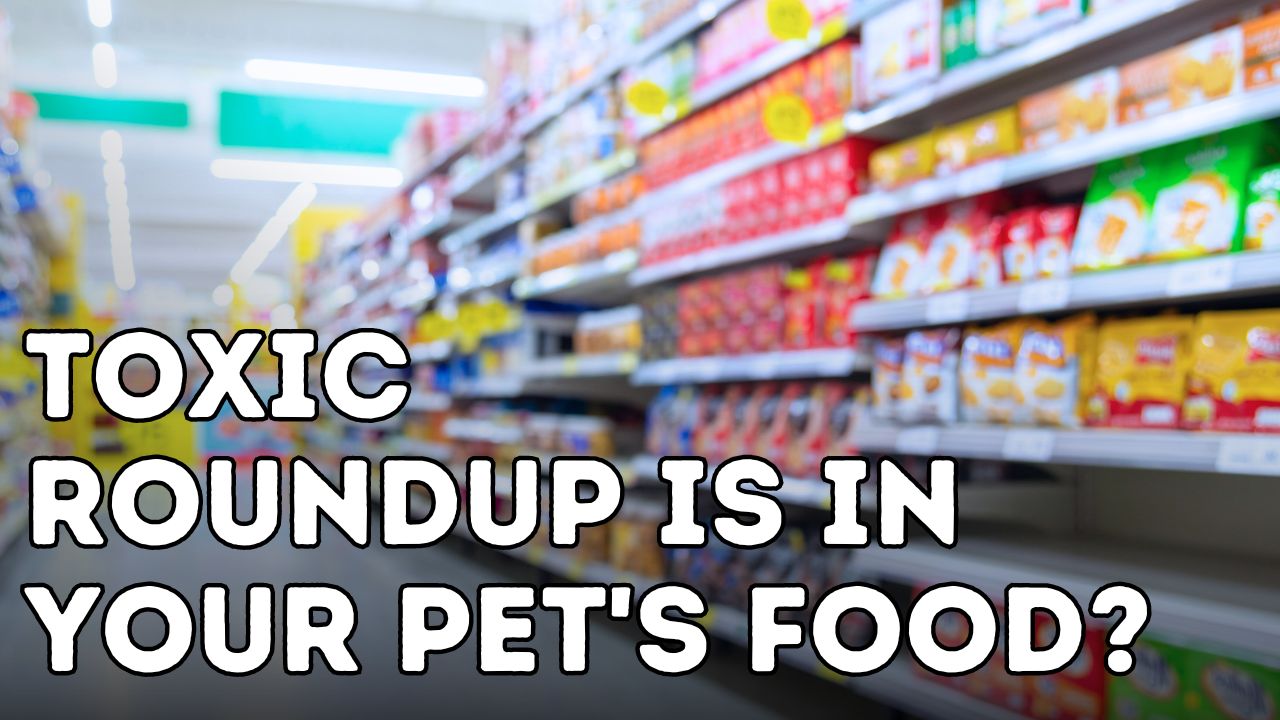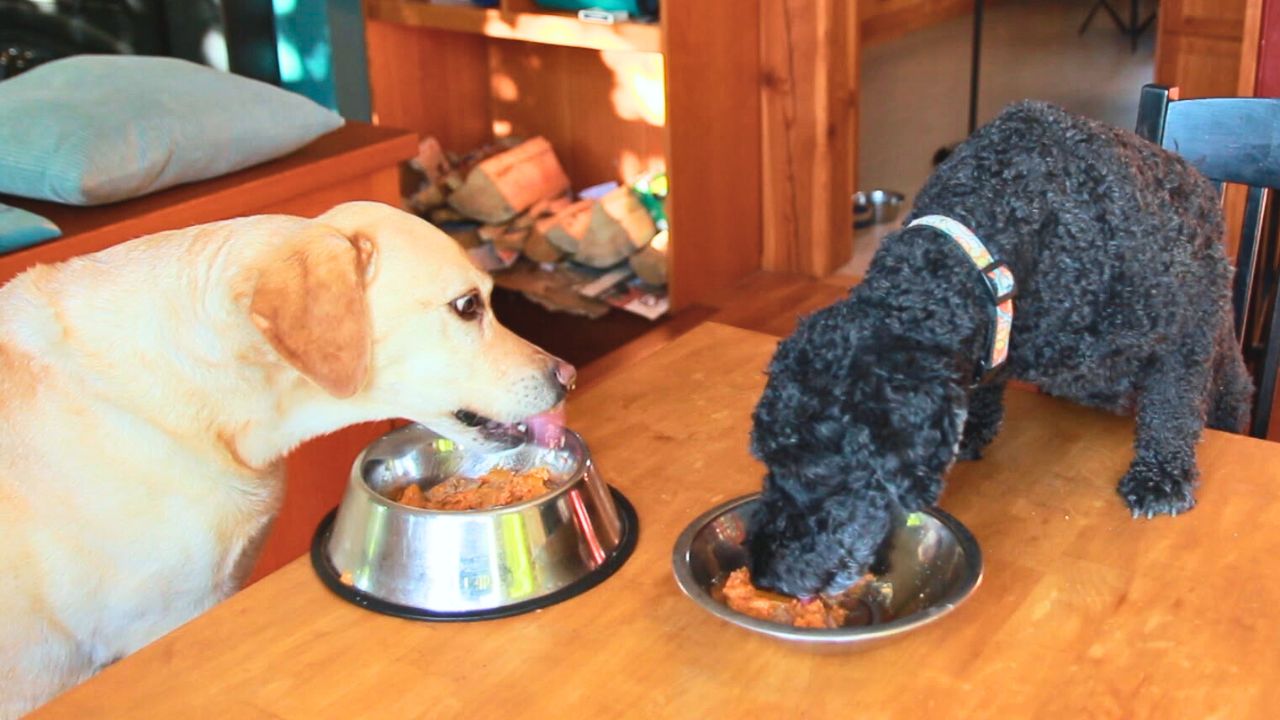Is Your Pet’s Food Contaminated with RoundUp™ (Glyphosate)?

As a veterinarian and pet owner, I want to share with you a serious concern that many people may not be aware of— the toxin Glyphosate, commonly known as RoundUp. This chemical is more harmful than you might think, and the scariest part is that you may unknowingly be feeding it to your dog or cat through contaminated food.
How Glyphosate Harms Your Pet’s Liver
One of the primary side effects of Glyphosate is liver damage. When your pet’s liver is compromised, it can no longer function properly, leading to disease and other health issues. This is something I’ve seen far too often in my practice, and it’s something that can be prevented.
Natural Treatments for Liver Disease
Fortunately, there are natural treatments that can support liver health and help manage elevated liver enzymes in dogs. Some of the most effective treatments include:
- Milk Thistle: Known for its ability to protect and regenerate liver cells.
- SAMe: An antioxidant that aids in liver detoxification.
- Vitamin E: Offers protection from oxidative damage.
- Dandelion Root: A natural detoxifier that supports overall liver function.
Introducing Our NEW Liver Support Chews
To make it easier for pet owners like you to support your dog’s liver health, we’ve formulated a product that includes all of these powerful natural remedies. Dr. Jones’ ULTIMATE Liver Support Chews are a great option for any dog with elevated liver enzymes. These chews are specifically designed to help your pet’s liver heal and function more effectively.
You can find them here:
Dr. Jones’ ULTIMATE Liver Support Chews

By incorporating these natural treatments, you can take a proactive approach to safeguard your pet’s health against the harmful effects of Glyphosate.

RoundUp™ (Glyphosate) is in Your Pet’s Food: What You Need to Know
As many of you may know, glyphosate—more commonly recognized by its brand name, RoundUp™—has gained a reputation for being a potential cause of non-Hodgkin’s lymphoma due to several high-profile lawsuits. But did you know that this herbicide may also be lurking in your pet’s food?
Glyphosate and Its Potential Risks to Your Pet
While glyphosate is often linked to non-Hodgkin’s lymphoma, recent research suggests it may also contribute to other health issues. Studies have found connections between glyphosate exposure and diseases such as nonalcoholic fatty liver disease and DNA damage. Other studies raise concerns about potential endocrine and reproductive issues, though results are mixed. Some researchers even hypothesize that glyphosate could be linked to kidney damage, celiac disease, and gluten intolerance.
Now, you might think, “Should I be concerned about my pet’s exposure to glyphosate?" The short answer is yes, even though it’s a bit more complicated.
Glyphosate in Pet Food: What the Research Says
A Cornell University study detected glyphosate in all the dog and cat food samples they tested. This herbicide was present at levels considered “safe” for human consumption. However, the EPA and FDA maintain that it’s safe to consume a substance that is a known carcinogen—something I firmly disagree with.
Are Pets Affected by Glyphosate?
In Europe, poison control centers track cases of glyphosate poisoning in pets. Acute glyphosate poisoning in companion animals—typically from eating grass or walking on freshly sprayed areas—has led to fatal outcomes in some instances. Chronic exposure is harder to quantify due to limited research, so researchers apply the human acceptable daily intake level to pets, which is far from ideal.
A 2016 study in New York tested 30 dogs and 30 cats for glyphosate levels and found the substance was widespread, with glyphosate levels twice as high in cats compared to dogs. The researchers used human standards to assess safety for pets, but as a veterinarian, I firmly believe our pets deserve species-specific safety levels.
Another Cornell University study found glyphosate in all 18 pet food brands they tested. The amount of glyphosate was strongly correlated with crude fiber content, indicating the herbicide likely comes from plant products like GMO corn, soy, and beets. Alarmingly, the most contaminated pet foods resulted in exposure levels that were 7.3% to 25% above the average daily intake for humans.

Pet Food Brands Contaminated with Glyphosate
Here’s a partial list of pet foods found to contain glyphosate:
- Purina Cat Chow Complete: 0.102 glyphosate/mg kg
- Purina Dog Chow Complete: 0.098 glyphosate/mg kg
- Kibbles-n-Bits Chef Choice: 0.300 glyphosate/mg kg
- Friskies Indoor Delights: 0.079 glyphosate/mg kg
- 9 Lives Indoor Complete: 0.140 glyphosate/mg kg
- Rachel Ray Zero Grain: 0.022 glyphosate/mg kg
- Iams Proactive Health: 0.065 glyphosate/mg kg
- Rachel Ray Nutrish Super Premium: 0.140 glyphosate/mg kg
- Purina Beyond Natural – Simply Nine: 0.047 glyphosate/mg kg
One of the researchers was so concerned by these findings that they switched their dog’s food.
Reducing Glyphosate Exposure for Your Pet
Here’s what you can do to minimize glyphosate exposure for your pet:
- Don’t use herbicides like RoundUp—and encourage your neighbors to avoid them as well.
- Avoid areas that have been sprayed with RoundUp, such as parks, schoolyards, and golf courses. In my area, even forested land is sprayed after logging.
- Feed your pet fresh, organic foods whenever possible. Organic options are less likely to contain glyphosate.
- Limit or avoid commercial kibbles and canned foods, as these are most likely to contain glyphosate.
- Choose GMO-free commercial pet foods if you must use them.
Glyphosate Levels in Pets: What the Data Shows
A comprehensive research project by the Health Research Institute Laboratories (HRI) measured glyphosate levels in pet urine, and the findings were startling. Dogs and cats had significantly higher levels of glyphosate compared to humans. Here’s what they found:
- Cats: 8 ppb—16 times higher than humans.
- Dogs: 15.8 ppb—32 times higher than humans.
- Raw food diets: Virtually no detectable glyphosate.
- Canned food diets: Higher levels of glyphosate.
- Dry kibble diets: Even higher levels of glyphosate.
- Grain-free kibble diets: The highest glyphosate levels, likely due to ingredients like oats, pea protein, chickpeas, and lentils.
Heal Your Pet Naturally
No level of glyphosate should be considered safe for pets or people. The widespread use of glyphosate not only contaminates our pets’ food but also disrupts ecosystems.
Glyphosate is sprayed on ‘RoundUp-ready’ crops like corn and soy, which then enter our food system and, consequently, our pets’ food. I often see pets with elevated liver enzymes on blood tests, which indicates the liver—the primary organ responsible for processing everything they eat—is being overworked. If your pet consumes glyphosate, it could damage their liver over time. This is particularly concerning for pets on medications like anti-inflammatories, which already stress the liver.
For liver support and recovery, I recommend Dr. Jones’ ULTIMATE Liver Support Formula—a natural remedy proven to promote liver health.
Dr. Jones’ ULTIMATE Liver Support Chews

Glyphosate exposure is a growing concern for both pets and humans. While there is still much we don’t know, one thing is certain: we need to be proactive in protecting our pets from this dangerous herbicide.
Take steps to reduce glyphosate exposure by feeding your pet fresh, organic food and avoiding commercial pet foods with high glyphosate levels.
P.S. The most common sign of glyphosate exposure in pets is elevated liver enzymes, which can indicate liver damage. If your pet is exposed to glyphosate, be sure to monitor their liver health and consider natural remedies to support recovery.

